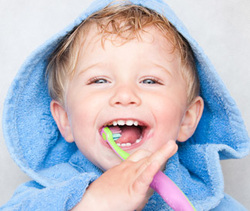DENTAL HEALTH IN CHILDREN

We provide exceptional care for you and your family, throughout the different stages of your lives. From your baby's first tooth, through to managing wisdom teeth, we offer experienced advice and guidance to care for your family's dental needs.
Babies and children
How do I look after my baby’s teeth?
Good oral care starts from the beginning of your child's life.
Even before their first teeth emerge, certain factors can affect their future appearance and health.
For instance, tetracycline, a common antibiotic, can cause tooth discoloration, so they should not be used by expectant or nursing mothers in the last half of pregnancy.
As baby teeth usually emerge around six months of age, special care should be taken to look after their oral health.
What is 'baby bottle decay'?
Importantly, every step should be taken to prevent against 'baby bottle decay'. This is caused by frequent exposure, over time, to liquids (such as milk, formula and fruit juices) containing sugars. When sugary liquids pool around teeth for long periods of time (such as during baby’s sleep), it will lead to devastating effects on the newly erupted teeth, such as cavities developing in the upper and lower front teeth.
For this reason, babies should not fall asleep with a bottle of juice or milk in his mouth. Instead, at naptime, give your child a bottle filled with water.
If breastfeeding, avoid letting the baby nurse continuously. After each feeding, wipe your baby's teeth and gums with a clean, damp washcloth or a gauze pad.
How do I look after my child’s teeth?
Teaching your child about the importance of looking after their oral health is one of life’s most important lessons.
This means helping them brush twice a day (in the morning and before bed time), limiting between-meal snacks and seeing the dentist regularly.
It is a good idea to supervise your child's brushing until they are at least six years old. The following tips outline the best ways to brush:
Teeth start to erupt at about six months and continue until age three. This causes many children to have tender gums, which can make them irritable, while some babies may experience a slight fever.
The best ways to relieve this discomfort include rubbing the gums with your finger or a frozen teething ring.
There are also pain relief gels and medications available especially for babies during teething.
If you need advice about looking after your baby during teething, contact us for some tips and suggestions.
When should children have their first dental visit?
It is recommended children start their dental visits from the age of two.
At Griffith Dental & Medical Surgery, we take a special approach so children enjoy visiting the dentist.
The team use a range of interesting and interactive activities and techniques to make it a very positive, fun experience.
Many adults are anxious about visiting the dentist and these perceptions have usually stemmed from a negative childhood experience; this can definitely be avoided by ensuring children feel extremely comfortable and relaxed with their dentist.
Your child’s first (and subsequent) visit is an important opportunity to monitor their dental growth and development, while for parents, it is a chance to learn about teeth development, tips on helping children maintain proper oral hygiene to prevent any future dental problems.
What should I do before my child’s first dental visit?
You can help your child by talking about the upcoming trip to the dentist.
It is important to emphasise that the visit will be very positive and explain how it will ensure they have strong and healthy teeth. By fostering a positive attitude, you'll help your child become confident about visiting the dentist regularly throughout their life.
Teens
What do teens need to know in order to best look after teeth?
A balanced diet is necessary for your child to develop strong, decay-resistant teeth. This means their diet should include plenty of calcium, phosphorous and adequate levels of fluoride.
Frequent snacking is a major cause of teeth decay. The sugars and starches found in many foods such as biscuits, chocolate, lollies and soft drinks combines with the plaque on teeth to form acids. These acids attack the tooth enamel and may lead to cavities. Each "plaque attack" can last up to 20 minutes after a meal or snack has been finished.
Our advice? Cut down and limit snacking in between meals and minimise the intake of sweet and sticky foods. Instead, try and stick to healthy snacks such as plain yoghurt, cheese or raw vegetables.
What preventative steps can I take to look after my teenagers’ teeth?
At Griffith Dental & Medical Surgery, we make custom-fitted mouthguards by taking an impression of your child’s teeth and assessing their mouth to ensure the mouthguard fits accurately and is the right size/fit for them.
The end result is a mouthguard which is tailor-made and offers maximum protection, comfortable and enables the child to speak easily and does not do not restrict breathing.
Contact us today and make an appointment to find out more.
Babies and children
How do I look after my baby’s teeth?
Good oral care starts from the beginning of your child's life.
Even before their first teeth emerge, certain factors can affect their future appearance and health.
For instance, tetracycline, a common antibiotic, can cause tooth discoloration, so they should not be used by expectant or nursing mothers in the last half of pregnancy.
As baby teeth usually emerge around six months of age, special care should be taken to look after their oral health.
What is 'baby bottle decay'?
Importantly, every step should be taken to prevent against 'baby bottle decay'. This is caused by frequent exposure, over time, to liquids (such as milk, formula and fruit juices) containing sugars. When sugary liquids pool around teeth for long periods of time (such as during baby’s sleep), it will lead to devastating effects on the newly erupted teeth, such as cavities developing in the upper and lower front teeth.
For this reason, babies should not fall asleep with a bottle of juice or milk in his mouth. Instead, at naptime, give your child a bottle filled with water.
If breastfeeding, avoid letting the baby nurse continuously. After each feeding, wipe your baby's teeth and gums with a clean, damp washcloth or a gauze pad.
How do I look after my child’s teeth?
Teaching your child about the importance of looking after their oral health is one of life’s most important lessons.
This means helping them brush twice a day (in the morning and before bed time), limiting between-meal snacks and seeing the dentist regularly.
It is a good idea to supervise your child's brushing until they are at least six years old. The following tips outline the best ways to brush:
- use a pea-sized amount of children’s toothpaste and ensure your child doesn't swallow the paste
- use a toothbrush with soft bristles and brush the inside surfaces of all teeth first (where plaque accumulates most). Angle bristles toward the gumline and brush gently back and forth
- clean all the outside surfaces of teeth. Angle bristles toward the gumline and brush gently back and forth
- then place the brush so bristles are on the chewing surface of the teeth and brush gently back and forth
Teeth start to erupt at about six months and continue until age three. This causes many children to have tender gums, which can make them irritable, while some babies may experience a slight fever.
The best ways to relieve this discomfort include rubbing the gums with your finger or a frozen teething ring.
There are also pain relief gels and medications available especially for babies during teething.
If you need advice about looking after your baby during teething, contact us for some tips and suggestions.
When should children have their first dental visit?
It is recommended children start their dental visits from the age of two.
At Griffith Dental & Medical Surgery, we take a special approach so children enjoy visiting the dentist.
The team use a range of interesting and interactive activities and techniques to make it a very positive, fun experience.
Many adults are anxious about visiting the dentist and these perceptions have usually stemmed from a negative childhood experience; this can definitely be avoided by ensuring children feel extremely comfortable and relaxed with their dentist.
Your child’s first (and subsequent) visit is an important opportunity to monitor their dental growth and development, while for parents, it is a chance to learn about teeth development, tips on helping children maintain proper oral hygiene to prevent any future dental problems.
What should I do before my child’s first dental visit?
You can help your child by talking about the upcoming trip to the dentist.
It is important to emphasise that the visit will be very positive and explain how it will ensure they have strong and healthy teeth. By fostering a positive attitude, you'll help your child become confident about visiting the dentist regularly throughout their life.
Teens
What do teens need to know in order to best look after teeth?
- the importance of brushing twice daily and flossing daily
- maintaining a healthy diet (cutting down on sugary snacks and drinks)
- visiting the dentist regularly for check ups and professional cleaning
A balanced diet is necessary for your child to develop strong, decay-resistant teeth. This means their diet should include plenty of calcium, phosphorous and adequate levels of fluoride.
Frequent snacking is a major cause of teeth decay. The sugars and starches found in many foods such as biscuits, chocolate, lollies and soft drinks combines with the plaque on teeth to form acids. These acids attack the tooth enamel and may lead to cavities. Each "plaque attack" can last up to 20 minutes after a meal or snack has been finished.
Our advice? Cut down and limit snacking in between meals and minimise the intake of sweet and sticky foods. Instead, try and stick to healthy snacks such as plain yoghurt, cheese or raw vegetables.
What preventative steps can I take to look after my teenagers’ teeth?
- Fissure sealants – are a highly effective preventive dental procedure. It is very common for teeth to have deep grooves (or fissures) which can trap food, bacteria and plaque and subsequently cause decay.
Fissure sealants are a special coating placed over teeth to ‘seal off the grooves’ and prevent decay. The procedure is quick and completely painless. - Mouthguards – does your child play any of the following sports? AFL, Rugby, hockey, soccer, basketball, skateboarding or cricket? If so, they need to wear a custom-fitted mouthguard to protect them from dental injuries. A mouthguard from a dentist is essential as it helps absorb the impact caused by a blow to the face. Without this protection, a heavy blow can lead to chipped or broken teeth, loose or knocked out teeth and damage to the mouth and jaw. These injuries can require extensive treatment to restore the teeth and mouth back to normal function and appearance.
At Griffith Dental & Medical Surgery, we make custom-fitted mouthguards by taking an impression of your child’s teeth and assessing their mouth to ensure the mouthguard fits accurately and is the right size/fit for them.
The end result is a mouthguard which is tailor-made and offers maximum protection, comfortable and enables the child to speak easily and does not do not restrict breathing.
Contact us today and make an appointment to find out more.

